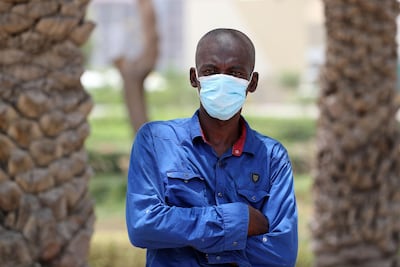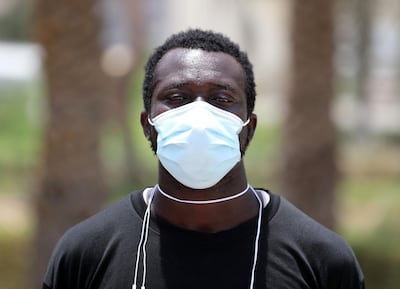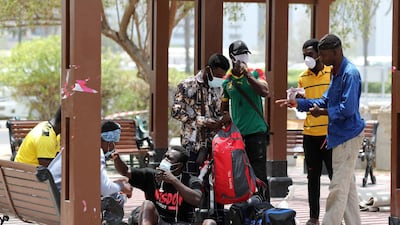UPDATE: Dubai charity steps in to help fund flights home for families from Ghana found sleeping in park
A group of men and women who were homeless and out of work have been taken in by Dubai Police.
Several dozen people, all from Ghana, were found sleeping in a park in the city's Satwa district, officials said.
On Monday, between 40 and 50 were taken to a temporary accommodation site in Jebel Ali.
And by Wednesday afternoon the full group, including 77 men and three women, were transferred to a new site in Al Quoz.
Officers said they were in contact with Ghana's consulate, where dozens had gathered on Sunday and Monday to ask for help.
The homeless hope to return to Ghana when it begins repatriation flights.
Many from the group said they lost their jobs before the coronavirus outbreak and some since.
A few others came to the country to search for work on visit visas and were stranded when the borders closed on March 19.
"We wanted to help solve this problem because we know many of them have lost their jobs or are on visit visas," a Dubai Police spokesman said.
"After we were alerted of their situation, we transported about 40 or 50 of them to accommodation where they could sleep.
"We are in contact with the embassy and consulate to help these people."
The Jebel Ali site is a series of air-conditioned tents, where officers said the group could stay until their embassy was able to help them.
When pictures of the group sleeping in the park emerged on social media, residents from across the city delivered food and water to help.
Moses, a father of five, was one of the men given accommodation.
“Now we have food and drink and a safe place to rest,” Moses said.

“I was sleeping in the park for about a week and volunteers were bringing us food. It was very difficult in the heat.
“Some police officers came on Sunday night and told us they will get us accommodation and within a few minutes a bus arrived and took us to Jebel Ali.
“The police have consoled us, motivated us. We didn’t get this from our own government but the UAE people, they’ve helped us.”
Moses said he arrived in Dubai on December 12 on a visit visa to look for work. After months of job hunting, he ran out of money.
He wants to stay in the UAE to find a job but will probably have to return home.
Michael Agyapong, 23, was one of the group who did not opt for temporary accommodation.
Mr Agyapong said he would stay in the park and visit the nearby consulate each day in the hope of getting home.
“I don’t want to be a burden on the UAE and keep taking food and drink from people," he said.
"It brings shame on me, I just want to go home to my daughter, mum and dad."
Mr Agyapong said he arrived in Dubai on March 3 after paying more than Dh5,000 for a flight and visit visa.
A friend working in Dubai had assured him he would find work quickly, but job opportunities dried up when the coronavirus outbreak hit.
“I don’t have social media, I don’t follow news much, so I was not aware of how bad the pandemic was getting when I came,” Mr Agyapong said.
“I paid Dh700 for a share room in Dubai and then moved to Ajman because it was cheaper. I paid Dh400 for a bed space."
Unable to find a job, Mr Agyapong called a travel agent in mid-March to book a flight home but the borders closed on March 19.

"Now I have no money left," he said. "I need our consulate and government to help me get home.
"I’ve been sleeping outside for about one month now and I don't have funds to buy a flight ticket when they become available."
Some people in the group, who did not want to be identified, said their employers still had their passports, which is against the law, despite being let go from their jobs.
Although the borders of Ghana remain closed, the group said they were relying on their government to arrange chartered flights to help them return.
In April, a similar scheme was set up by the Indian government allowing nationals to board repatriation flights, despite a total lockdown in India.
More than 350,000 people have signed up, with about 16,000 returning home so far, the Indian embassy said this week.
Many had lost jobs or had their salaries cut because of the economic effects of Covid-19. Others were tourists stranded in the country when flights were grounded.
More than 11,500 Pakistanis and 6,000 Filipinos have also been repatriated in the past couple of months.
About 27 special flights to Pakistan have been scheduled in the first 10 days of June.
Meanwhile, the consulate general of Ghana said it was working to resolve the issue.
“Some members of the group first reported at the Ghanaian consulate on the evening of May 25 and were addressed by the consul general the next morning,” said Kofi Mumuni, from the consulate’s welfare department.
“The consul general pleaded with them to return to their various accommodations in the UAE while staff finalised ongoing arrangements for their evacuation to Ghana.
“While they agreed and left the consulate, some of them went to camp at the park.
“We have been working with Ghana and the UAE authorities in collaboration with Emirates Airlines to evacuate our stranded nationals and arrangements are almost concluded.”
_________
Gallery: Coronavirus in the UAE

















